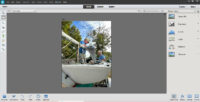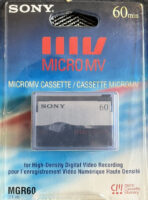Your local camera rental house can do more for your business than you might realize.
When you get a job that requires equipment you don’t own, first see who you know who might own the equipment you need. Then check rental houses. If you’re thinking of buying a new camera, but want some hands-on shooting time with this puppy before you take the plunge, a one day rental could answer all your questions.
When you’re producing a video for a business or non-profit, your job is to deliver a video that accomplishes the goal of your client. Even though you may own nearly all of the equipment to do that, you can’t own it all. The client pays these rentals anyway even though payment is indirect. The client pays the producer. The producer pays the rental company. The additional gear helps you produce a better video which helps your client’s business. And that’s the bottom line. Your client doesn’t care about the tools used, only the results.
Back when I was preparing to take the assistant cameramans’ test for admission to the cameramans’ union in New York, I spent many pleasant hours at the camera rental houses learning the 11 different film cameras I’d need to know to pass the test. Rental houses, then and now, are a great place to learn not only the equipment, but to get in touch with the larger scale video business in your area.
Need a moving shot or two? Rent a dolly, crane or jib arm. Not sure what gear to use for a particular shot? One of the technicians at the rental house probably knows.
Below are some examples of rental prices. These prices drop for longer rentals. You may also be able to rent over the weekend and stretch your rental dollars.
Panasonic AG-MX70 Digital AV Mixer/Switcher, $250.00/day; < br>
Canon EOS 7D DSLR Camera, $149.00/day; < br>
Red One Camera, $895.00/day;< br>
Jib Arm with spider dolly and track $125.00/day;< br>< br>
Accessories may be additional.
Renting, as opposed to owning, makes good business sense for expensive equipment you won’t use often. Ownership makes the most sense when you can pay for the equipment several times over before it becomes obsolete. Then, of course, ownership makes a lot of sense.
Some people buy used gear and then sell it before it loses too much value on the used video market. If you are disciplined and do your home work, this can be a smart way to go.
Leasing or leasing to buy is another option that sounds appealing. But many of these deals are too expensive when you look at all the numbers. Be sure to do the numbers with due diligence before you lease.
For many situations renting is the smart way to do business. Some producers own no equipment at all and only rent when the job requires it. Today this is not practical for most of us in video, but at some levels of production, it is the only smart way to go. When I first started producing corporate videos, the equipment was a lot more expensive than it is today. So I rented just about everything, one job at a time. The money we’d save by renting all went into marketing the business. Today renting is not the norm in the production business. But there are many times when renting can help you leverage the production values. And that makes everyone look good. To learn more about this strategy see our home study course “Professional Video Producer.”
Before you need to rent equipment, call your local rental houses and introduce yourself and tell them the kind of projects you bid on and how their gear might help you. Chances are, they’d love to have you drop in.
Setting Up An Account and Preparing to Rent
Before you can rent, you’ll need to set up an account with the rental company. Allow at least a week for them to check your application. You’ll need a valid certificate of insurance. This you can usually buy from the rental company, but you’ll save money if you can provide your own valid certificate of insurance. Call your insurance company with the requirements of the rental house. Typically they require all risk coverage that is equal to the replacement cost of the equipment. Check the insurance requirements long before you make your first rental.
Often you can pick up the gear after around 3:00PM on the business day before your first shoot date. And return it by 10:00AM or so on the day following your last shoot date.
Here’s a pretty complete list of rental houses in the US. If you have additions or corrections to this list, please let me know.






Recent Comments